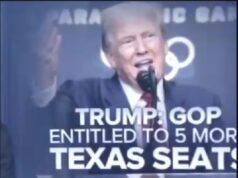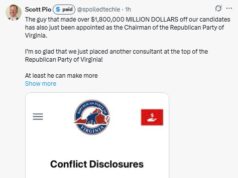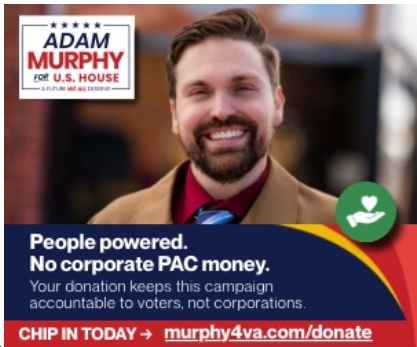By Josh Stanfield of Activate Virginia
Why would a Republican-stacked, questionably legitimate House Rules Committee report to the floor a radical campaign finance reform bill – without recommendation?
That’s the question I asked myself Friday evening. Speaker Cox has indicated he sees the Rules Committee as a “sort of traffic cop,” mulling over bills with experienced eyes then sending them to the appropriate committees. That’s what the Rules Committee did on Friday to HB 5, HB 7, and HB 122, bills prohibiting the personal use of campaign funds and establishing penalties, by referring them to the Committee on Privileges and Elections.
But then came HB 263, sponsored by Democratic Delegate Marcus Simon, which establishes the Virginia Democracy Voucher Program. This program essentially creates an optional system of publicly funded elections. Speaker Cox and every Republican, joined by Democratic Delegates Plum, Carr, and Bagby, voted to report the bill to the floor without recommendation. Democratic Delegates Toscano, Ward, and Torian did not vote.
I couldn’t understand why the Speaker and his Republican colleagues would refer to the floor a relatively obscure campaign finance reform idea, recently tested in Seattle municipal elections, that doesn’t include a means of funding.
So I deferred to Occam’s razor. Maybe Speaker Cox just wants a floor vote on a West Coast campaign finance reform bill that requires taxpayers to put up millions of dollars. It could be useful for campaign purposes to get freshmen Democrats in swing districts on the record here. It might also demonstrate the obvious split amongst Democrats on questions of money in politics.
Though that’s the simplest explanation, I want to explore another possibly with you, one that may seem conspiratorial on its face. But one that provides wins to too many political actors and therefore cannot be ignored.
Virginia Democracy Voucher Program
HB 263 creates the Virginia Democracy Voucher Program. This is modelled after Seattle’s Democracy Voucher Program that resulted from a November 2015 referendum. Seattle deployed this program in its 2017 city council/city attorney elections. Seattle citizens voted to fund the program via a $3 million per year property tax increase.
Let’s go through the Virginia Democracy Voucher Program (text here) and get a feel for its major components (line numbers in parentheses):
The Department of Elections mails $100 worth of Democracy Vouchers to all registered voters who can then donate them to candidates participating in the program (20-35). The program covers statewide elections for Governor, LG, and AG, in addition to General Assembly elections (17-18).
Candidates who wish to enter the program must agree to participate in three primary debates and three general debates (56-67), cannot fundraise for any political or political party committee (60-61), and must receive a number of qualifying contributions in advance from voters within the district – 1,000 contributions for statewide office, 250 for Senate of Virginia, and 125 for House of Delegates (62-68).
Candidates in the program cannot solicit or accept individual contributions over $500 or over $500 in aggregate contributions from any individual or entity during the cycle (70-72). Statewide candidates may not spend over $500,000 in the primary or $1,000,000 in the primary and general combined (79-80). Candidates for the Senate of Virginia may not spend over $75,000 in the primary or $150,000 in the primary and general combined (81-82). And candidates for the House of Delegates may not spend over $50,000 in the primary or $100,000 in the primary and general combined (83-84).
If a participating candidate demonstrates the opponent (whether participating or not) exceeds the above caps, the Department of Elections can release the participating candidate from the spending/contribution limits. Outside independent expenditures are also taken into consideration (85-98).
Those are the basics. There’s no mention of how this program will be funded, and the impact statement suggests in the 2019 cycle the redeemable figure could be as high as $31.6 million. Line 106 of the bill critically states (as was the case in Seattle) that “vouchers shall be redeemed only if Program funds are available.”
Who Would Enroll?
Let’s consider how this program might play out if somehow, in this long-shot scenario, it were passed by the General Assembly and signed into law by the Governor. Who would actually enroll in this program?
Democrats in safe districts? It’s conceivable that some Democrats, perhaps in Northern Virginia, might choose this option and load up on the vouchers of their supporters while touting campaign finance reform credentials. They don’t have Republican opponents, after all, so there’s no threat of having to spend much money in an election.
Republicans in safe districts? Probably not – too busy bundling and likely not interested in West Coast taxpayer-funded radical reform.
Democrats in competitive districts? Or Republicans in districts potentially up for grabs this year (via Bethune-Hill) or in 2019? It would be an incredibly hard sell. If you’re confronting a serious challenger from the opposing party, a challenger with over half a million in cash, you’re not likely to handicap yourself with a spending cap. To use a favorite line of Virginia Democrats, it’d be like tying one arm behind your back. And although HB 263 allows the Department to remove spending/contribution limits in unfair matchups, there’s no timeline or explanation of this process in the bill.
Scale & Adaptability
This voucher model hasn’t been tried at a statewide scale yet. Seattle voters intentionally limited it to last year’s city council and city attorney races – not the mayoral – to ensure there were sufficient funds to pay for it. It ended up costing $1.4 million.
Unlike Virginia, Washington already has in place reasonable campaign finance laws, including caps on contributions from individuals and corporations ($1,000-$2,000). Our lack of contribution limits would create a David vs. Goliath scenario for anyone daring to enroll in a competitive district.
Convenient Cover?
What purpose, beyond the Occam’s razor explanation above, could this bill serve on the House floor? Over the past few weeks, we’ve seen widespread condemnation of the “Grid Transformation and Security Act of 2018,” also known as the Dominion/Saslaw/Wagner/Bagby transition away from the 2015 “rate freeze” law. This new attempt to change the electric regulatory dynamics is what Dan Casey calls the “fourth screwing” of ratepayers:
“The former biennial rate reviews would become triennial rate reviews, or every three years, dragging them out over an even longer term. No longer could the SCC order any refunds to consumers if it found overcharges in two successive rate-review periods, as the 2007 law allowed. Instead, the power companies could “invest” those overcharges on their own expansion…If the General Assembly approves this stuff, it’ll represent an almost complete defanging of the SCC’s authority to regulate the electric monopolies.”
Governor Northam, to his credit, has voiced “significant concerns” no doubt exacerbated by such audacious, self-serving legislation from Dominion. The word “corrupt” has been tossed around. Delegate Bagby, a sponsor of the House version of the Dominion/Saslaw legislation, is now taking heat over a six-figure contribution to his charity by Dominion. And environmentalists oppose the bill.
In a town hall yesterday, Democratic Senator Dick Saslaw claimed he’s “totally rewritten” the legislation in question. Saslaw says we’ll see the new legislation this Tuesday and that he’ll have “all of the major groups in this state” on the same page.
Nobody seriously expects a bill from Saslaw that puts the interests of ratepayers over those of Dominion – a clean repeal like Democratic Senator Chap Petersen’s SB 9 (passed by indefinitely in committee) or its House analogue HB 96. Instead, legislators keen to push Dominion’s new iteration might need some PR cover on the corruption issue. They’d probably also like to divide the the so-far united opposition to this legislation, and that could be accomplished with handouts to environmental groups and a bone to campaign finance reformers.
But let’s continue with the long-shot scenario: HB 263 (Democracy Voucher Program) passes the House and Senate by the slimmest of margins, perhaps with funding secured via Saslaw’s new Dominion bill, and Governor Northam signs it into law. The Governor gets to own a bill that on the surface represents monumental campaign finance reform. Delegate Simon, as sponsor, receives similar accolades. And everyone drenched in campaign contributions from Dominion can vote for a Dominion regulatory bill and have some cover on the corruption issue if necessary.
Substantive Reform?
The Virginia Democracy Voucher Program doesn’t address the fundamental flaws in Virginia’s campaign finance system. All the usual corporate and special interest donors will remain permitted to contribute as they please, without limits, and their favorite legislators will have little incentive to abandon this system.
The Seattle Times Editorial Board opposed democracy vouchers before the 2015 vote out of concern that it advantages incumbents, raises taxes, and couldn’t be reasonably expected to limit overall campaign spending in general. Last July, Bob Young at The Seattle Times reported on the persistence of big money in the elections despite democracy vouchers. At the same time, the democracy vouchers did seem to have a democratizing effect on the makeup of donors: younger and poorer voters became more active in donating.
There’s no doubt that democracy voucher programs are interesting experiments with potential democratizing effects. If Virginians – and their legislators – want to push campaign finance reform that actually addresses the fundamental problems, however, there are a couple viable options currently under consideration in the General Assembly.
Governor Northam ran on the relatively radical notion of banning contributions from all corporations and capping individual contributions. A more incremental, pragmatic approach is to selectively ban contributions from public service corporations (HB 562) – legislation supported by over 50 candidates and incumbents in 2017. The lowest-hanging fruit is HB 7 which prohibits the personal use of campaign funds.
Neither of the above bills requires distributing taxpayer (or ratepayer) funds to politicians. Both of the above bills directly address problems with Virginia’s campaign finance system.
The Vote
We can’t know what will happen when HB 263 goes to the House floor. Democrats who care deeply about reforming Virginia’s campaign finance system, however, should feel no pressure to support this bill. At the very least it could be a trap, a prompting of the campaign line: “Delegate X voted for a multi-million-dollar program that funnels taxpayer money to politicians.”
If the long-shot scenario somehow materializes, the stakes are even higher, and Democrats will find themselves at a crossroads. Do you support a bill that does nothing to combat the sordid influence of corporate and special interest money in our elections – if it gives cover to politicians pushing policy that hurts ratepayers? Or do you call out such a cynical ploy for what it is: a deal with the devil that must be rejected?












